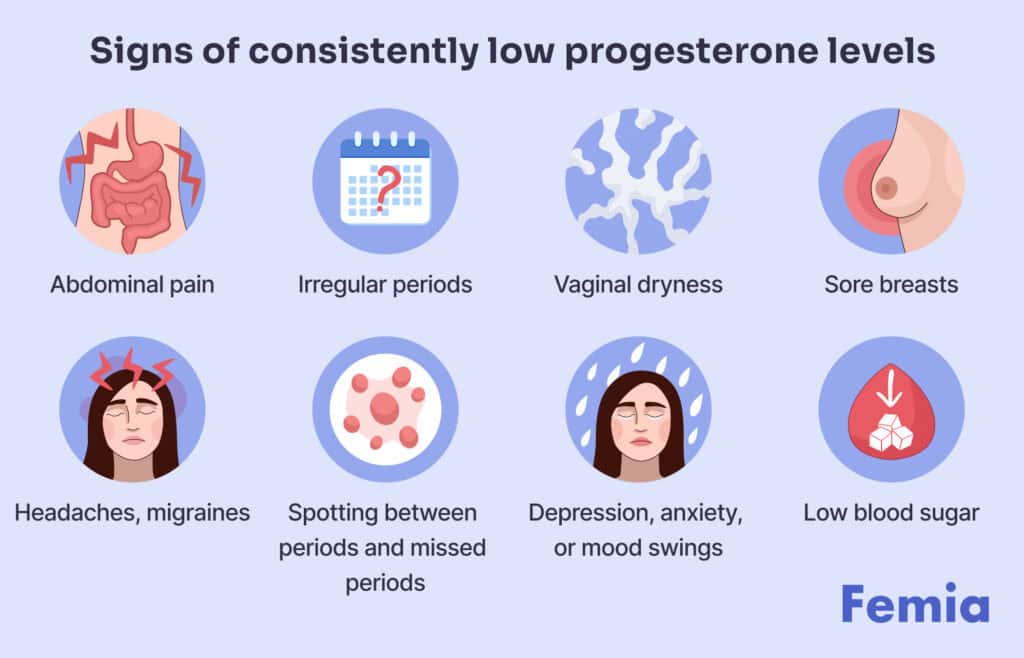Femia > Health Library > Your cycle > Health > How to increase progesterone naturally: Boost fertility and hormone balance
How to increase progesterone naturally: Boost fertility and hormone balance

- Updated Feb 10, 2025
- Published
CRAFTED BY HUMAN
Crafted by human At Femia, we provide accurate and up-to-date information at every stage of your journey, from trying to conceive, pregnancy and postnatal support. All content is created by a real person based on in-depth research and own professional experience. Femia ensures that you will receive expert advice, strict accuracy and a personalized approach from our authors/medical experts. Learn more about our editorial policy.
FACT CHECKED
Fact checked At Femia Health, we maintain the highest standards of editorial excellence in delivering content focused on helping you conceive, guiding you through pregnancy, and supporting you postpartum. Explore our content review principles to learn how we ensure the accuracy and quality of our health and lifestyle tips for every stage of your journey.
- Natural ways to boost progesterone include: eating foods rich in zinc, magnesium, and omega-3 fatty acids, managing stress and sleep, and exercising.
- Supplements like Vitex, Maca root, and vitamins B6, C, and E may help.
- If natural methods don’t work, consult a healthcare provider. Medical treatments like hormone replacement therapy might be necessary.
Progesterone is an important hormone in our bodies, especially for women. It plays a key role in the menstrual cycle and is crucial for pregnancy. Think of it as a helpful friend that prepares your body for potential pregnancy each month.
During pregnancy, progesterone levels naturally increase. This helps support the growing baby and prevents new ovulation. If progesterone levels are low, it can sometimes lead to irregular periods or make it harder to get or stay pregnant.
While there’s no magic wand to instantly boost progesterone, there are some natural ways that might help support healthy hormone function. So, let’s learn how to naturally increase progesterone.
Femia helps millions of women understand and balance their hormones
What causes low progesterone?
Low progesterone levels often cause irregular periods, make it difficult to conceive and cause a higher risk of miscarriage. Healthy progesterone levels will depend on many factors, including sex, age, and health history. Also, progesterone levels change throughout the menstrual cycle and pregnancy.

Signs of consistently low progesterone levels are:
- Abdominal pain;
- Irregular periods;
- Spotting between periods and missed periods;
- Vaginal dryness;
- Sore breasts;
- Depression, anxiety, or mood swings;
- Low blood sugar;
- Headaches/migraines.
However, there are many other factors affecting progesterone levels that aren’t related to menstruation. Here’s a quick overview:
- Anovulation. A health disease when women’s ovaries don’t release an egg (ovulation doesn’t happen).
- Polycystic ovary syndrome (PCOS). A hormone imbalance causing missed periods and unpredictable ovulation. PCOS may also cause small cysts to develop in ovaries.
- High stress. Cortisol, a human stress hormone, can interfere with the body’s ability to produce progesterone.
- Hypothyroidism. A slow or underactive thyroid, which makes it harder for your body to produce enough progesterone.
- Hyperprolactinemia. In this disease, human bodies make too much prolactin—the hormone responsible for lactation. High prolactin interferes with other sex hormones, including progesterone, so it may cause irregular cycles or loss of your menstrual period.
- Low cholesterol. Low cholesterol levels can sometimes cause low progesterone.
- Perimenopause. This is a normal process before menopause where hormone levels naturally decline.
- Over-exercising or extreme dieting. Such lifestyles increase cortisol levels and put your body under stress, depriving it of key nutrients that help maintain healthy hormone levels.
👉Find out more: Cycle syncing workouts: Exercise according to your menstrual cycle
How to increase progesterone naturally
Let’s explore several approaches you may focus on when wondering how to treat low progesterone naturally:
Lifestyle changes
- Stress management. Consider meditation, yoga practices, and breathing exercises to lower cortisol levels.
- Adequate sleep. Try to get 7–9 hours of quality sleep each night to help regulate normal hormone production.
- Regular exercise. Focus on moderate exercises such as walking, stretching, or swimming. Sport helps reduce cortisol and maintain healthy body weight, which is essential for progesterone production.
Dietary tips
Add more progesterone foods to the diet. These include:
- Healthy fats. Avocados, coconut oil, nuts, and seeds support hormone balance.
- Zinc-rich foods. Zinc is crucial for the pituitary gland, since it helps regulate hormone production. Consume foods like pumpkin seeds, lentils, and dark chocolate.
- Magnesium-rich foods. Magnesium is also vital for regulating hormone health, and it is found in foods like spinach, kale, almonds, cashews, and whole grains.
- Omega-3 fatty acids. Fish like salmon, sardines, and mackerel help produce and balance hormones. These are found in chia seeds, flaxseeds, and walnuts.
Some foods disrupt hormone balance, so limit or avoid the following:
- Processed foods. Highly processed foods are high in fats, sugars, and artificial additives.
- Excessive caffeine. High caffeine intake is linked to decreased progesterone levels.
- Alcohol. Excessive alcohol intake has also been shown to damage liver function, which is vital for hormone metabolism.
👉Find out more: Cycle syncing diet: What to eat during each phase of your menstrual cycle
Herbal supplements
Aside from vitamins and foods that increase progesterone, herbal supplements may help support healthy hormone production. Here are some options:
- Vitex (Chasteberry). It has been shown to support the pituitary gland, which helps balance estrogen and progesterone levels. However, it’s important to note that while Vitex might affect hormonal balance, its effectiveness in specifically increasing progesterone levels isn’t conclusively proven.
- Maca root. This is an adaptogen that may support the endocrine system, therefore helping regulate progesterone levels. However, it’s important to understand that:
- Scientific evidence supporting maca’s effectiveness in increasing progesterone levels in humans is limited.
- Most studies on maca’s hormonal effects have been conducted on animals, and these results can’t be directly applied to humans.
- While some people report benefits from using maca, these experiences are anecdotal and not backed by robust scientific research.
- Ashwagandha. This adaptogen is known to help bodies manage stress levels, which may indirectly support normal hormone levels.
Supplements to increase progesterone
Some supplements and vitamins are also helpful in boosting progesterone levels. Let’s explore some of the most popular ones. Remember to consult a healthcare provider to get personal guidance on the best supplements for your case.
- Vitamin E. This antioxidant supports hormonal balance and can be either consumed through supplements or through foods like almonds, sunflower seeds, and spinach.
- Vitamin B6. This vitamin supports progesterone production. Bananas, turkey, chickpeas, and potatoes are a good source of this B6, but there are many supplements that contain all B vitamins for overall health.
- Vitamin C. This vitamin aids in the natural increase of progesterone, since it has been shown to support the adrenal glands, which play a crucial role in hormone synthesis.
- Magnesium. This nutrient is essential for hormone production. In addition to the foods mentioned above, you can consider taking supplements after consulting a healthcare provider.
You can also consider over-the-counter (OTC) progesterone supplements, which may come in the form of pills or cream. These are used to balance hormones and support fertility. It’s crucial to consult a physician if you’re considering them, particularly if you’re pregnant, have hormone-sensitive conditions, or experience irregular menstruation.
Medical treatment for low progesterone
Low progesterone affects women’s health, especially reproductive health, menstrual cycles, and pregnancy. If natural methods don’t help, you may consider medical treatments. The type and duration will depend on the severity of your symptoms and whether you are trying to conceive. It might be hard to figure out when to seek medical help when trying natural methods, so here are some cases where proactivity will be your best option:
- Irregular menstrual cycles or too heavy periods;
- Difficulty conceiving or maintaining pregnancy (not getting pregnant for over a year);
- Perimenopause or menopause (symptoms include hot flashes, night sweats, and mood changes);
- Luteal phase deficiency (a short second half of the menstrual cycle);
- Endometriosis.
One of the most popular methods to treat progesterone deficiency is hormone replacement therapy (HRT). It helps replenish low hormone levels, particularly estrogen and progesterone, and is a common treatment for women going through menopause or those who have severe hormonal imbalances.
How does HRT work?
HRT helps by replenishing a woman’s body with the ovarian hormones it lost during the menopausal transition in order to relieve symptoms. HRT usually includes estrogen and progesterone and mimics hormones produced by the ovaries. Two types of HRT may be prescribed:
- Combined HRT. This type is used for women having a hysterectomy and includes both estrogen and progesterone.
- Progesterone-only HRT. This type is prescribed for women who cannot take estrogen.
Tips to naturally boost progesterone for pregnancy
If you wonder how to increase progesterone to get pregnant, the answer is similar to what is written above, but your approach might be a bit more dedicated. Here are some tips to boost fertility by increasing progesterone levels:
1. Track ovulation
Progesterone levels rise after ovulation, as they help prepare the uterine lining for egg implantation. So, you can track ovulation to ensure you have intercourse during your most fertility window. Consider using ovulation predictor kits (OPKs), measuring basal body temperature (BBT), or monitoring cervical mucus changes to identify when you ovulate.
2. Maintain a balanced diet
A diet packed with nutrients is essential for hormone balance and progesterone production. As mentioned above, it’s best to add more healthy fats and foods rich in vitamin C, B6, Zinc, and Magnesium to your diet to help support healthy hormone production and fertility.
3. Manage stress
High chronic stress triggers the release of cortisol, which can deplete progesterone levels. Consider seeking professional help, speaking with friends, meditating and practicing yoga, and breathing exercises to reduce stress and improve sleep quality.
4. Stay active, but don't overdo it
Too-intensive exercises may cause hormonal imbalance and affect overall health. However, regular moderate physical activity, like walking and stretching, has been shown to improve circulation and hormone function alongside reducing stress. It’s best to have a balanced routine consisting of walking, swimming, and light cardio.
👉Find out more: Optimize your lifestyle with your menstrual cycle phases
When to seek medical help
If you experience symptoms of low progesterone, including irregular cycles, abdominal pain, vaginal dryness, sore breasts, mood swings, and difficulty conceiving, consult a healthcare provider as soon as possible to get a personalized treatment plan.
After analyzing your symptoms and their duration, your doctor will run a blood test to identify your progesterone levels. Although a blood test can detect low progesterone, doctors may need further examinations to diagnose the cause.
Femia helps millions of women understand and balance their hormones
Questions from the Femia community
Can exercise affect progesterone levels?
Yes, moderate regular physical activity can help you balance hormones, maintain a healthy weight, and reduce stress—all leading to better hormone production. However, it's best to avoid excessive exercise, as this can lower progesterone levels by releasing cortisol.
Is low progesterone always a sign of infertility?
Not always, but low progesterone levels can make it difficult to conceive and maintain a pregnancy. That is why it is best to consult a healthcare provider if you can't conceive for over a year, as it might be because of low progesterone.
I stress a lot, can it directly lower my progesterone?
Yes, chronic high stress increases cortisol—the stress hormone. This has been shown to suppress progesterone production.
The bottom line
Boosting progesterone naturally can be supported through a combination of lifestyle changes that include a nutrient-rich diet, stress and weight management, and healthy exercise habits. Herbs such as chasteberry, maca root, and evening primrose oil may also help.
However, it’s important to remember that individual needs can vary. Consult a healthcare provider to learn how to raise progesterone based on your specific case and to ensure that any supplements or lifestyle changes are safe for you.
References
- Wikipedia Contributors. “Progesterone.” Wikipedia, Wikimedia Foundation, 6 Jan. 2020, en.wikipedia.org/wiki/Progesterone.
- Cleveland Clinic. “Low Progesterone: Causes, Symptoms, Tests & Treatment.” Cleveland Clinic, 16 Jan. 2023, my.clevelandclinic.org/health/diseases/24613-low-progesterone.
- Cleveland Clinic. “Anovulation: Signs, Symptoms, Causes & Treatment.” Cleveland Clinic, 25 Aug. 2021, my.clevelandclinic.org/health/diseases/21698-anovulation.
- Mayo Clinic. “Polycystic Ovary Syndrome (PCOS) – Symptoms and Causes.” Mayo Clinic, 8 Sept. 2022, www.mayoclinic.org/diseases-conditions/pcos/symptoms-causes/syc-20353439.
- BodyLogicMD. “Learn How to Increase Progesterone in Women.” BodyLogicMD, BodyLogicMD, 5 May 2020, www.bodylogicmd.com/hormones-for-women/progesterone/#:~:text=Chronic%20stress%20is%20also%20a. Accessed 17 Sept. 2024.
- Mayo Clinic. “Hypothyroidism (Underactive Thyroid).” Mayo Clinic, 2022, www.mayoclinic.org/diseases-conditions/hypothyroidism/symptoms-causes/syc-20350284.
- Cleveland Clinic. “Hyperprolactinemia: What It Is, Causes, Symptoms & Treatment.” Cleveland Clinic, 5 Jan. 2022, my.clevelandclinic.org/health/diseases/22284-hyperprolactinemia.
- Cleveland Clinic. “Understanding Your Cholesterol Numbers | Cleveland Clinic.” Cleveland Clinic, 2022, my.clevelandclinic.org/health/articles/11920-cholesterol-numbers-what-do-they-mean.
- Cleveland Clinic. “Perimenopause: Age, Stages, Signs, Symptoms & Treatment.” Cleveland Clinic, 2021, my.clevelandclinic.org/health/diseases/21608-perimenopause.
- Kossman, D. A., et al. “Exercise Lowers Estrogen and Progesterone Levels in Premenopausal Women at High Risk of Breast Cancer.” Journal of Applied Physiology, vol. 111, no. 6, Dec. 2011, pp. 1687–1693, https://doi.org/10.1152/japplphysiol.00319.2011.
- Meissner, H. O., et al. “Hormone-Balancing Effect of Pre-Gelatinized Organic Maca (Lepidium Peruvianum Chacon): (I) Biochemical and Pharmacodynamic Study on Maca Using Clinical Laboratory Model on Ovariectomized Rats.” International Journal of Biomedical Science : IJBS, vol. 2, no. 3, 1 Sept. 2006, pp. 260–272, www.ncbi.nlm.nih.gov/pmc/articles/PMC3614604/.
- “Office of Dietary Supplements – Ashwagandha: Is It Helpful for Stress, Anxiety, or Sleep?” Ods.od.nih.gov, 24 Oct. 2023, ods.od.nih.gov/factsheets/Ashwagandha-HealthProfessional/#:~:text=Overall%2C%20the%20studies%20found%20that.
- Abraham, G. E. “Nutritional Factors in the Etiology of the Premenstrual Tension Syndromes.” The Journal of Reproductive Medicine, vol. 28, no. 7, 1983, pp. 446–464, pubmed.ncbi.nlm.nih.gov/6684167/.
- Coker, Sharna J., et al. “Effects of Low Vitamin c Intake on Fertility Parameters and Pregnancy Outcomes in Guinea Pigs.” Nutrients, vol. 15, no. 19, 1 Jan. 2023, p. 4107, www.mdpi.com/2072-6643/15/19/4107, https://doi.org/10.3390/nu15194107. Accessed 30 Oct. 2023.
- “Finding Your Fertility Window – Mayo Clinic Press.” Mayo Clinic Press, 3 May 2024, mcpress.mayoclinic.org/pregnancy/finding-your-fertility-window/. Accessed 17 Sept. 2024.
- Mayo Clinic. “Exercise and Stress: Get Moving to Manage Stress.” Mayo Clinic, Mayo Clinic, 3 Aug. 2022, www.mayoclinic.org/healthy-lifestyle/stress-management/in-depth/exercise-and-stress/art-20044469.
- Ranabir, Salam, and K Reetu. “Stress and Hormones.” Indian Journal of Endocrinology and Metabolism, vol. 15, no. 1, 2011, pp. 18–22, www.ncbi.nlm.nih.gov/pmc/articles/PMC3079864/, https://doi.org/10.4103/2230-8210.77573.

Twin pregnancy week-by-week: belly size, body changes, and development of twins in the womb. Understand how your babies grow week by week with images.

Discover why bloating during ovulation occurs, if it is normal, and its symptoms, causes, how long it lasts, how to relieve it, and more.

Can you take antidepressants while pregnant? Find an all-encompassing guide to antidepressants and pregnancy with risks, tips, safe options, and more.

